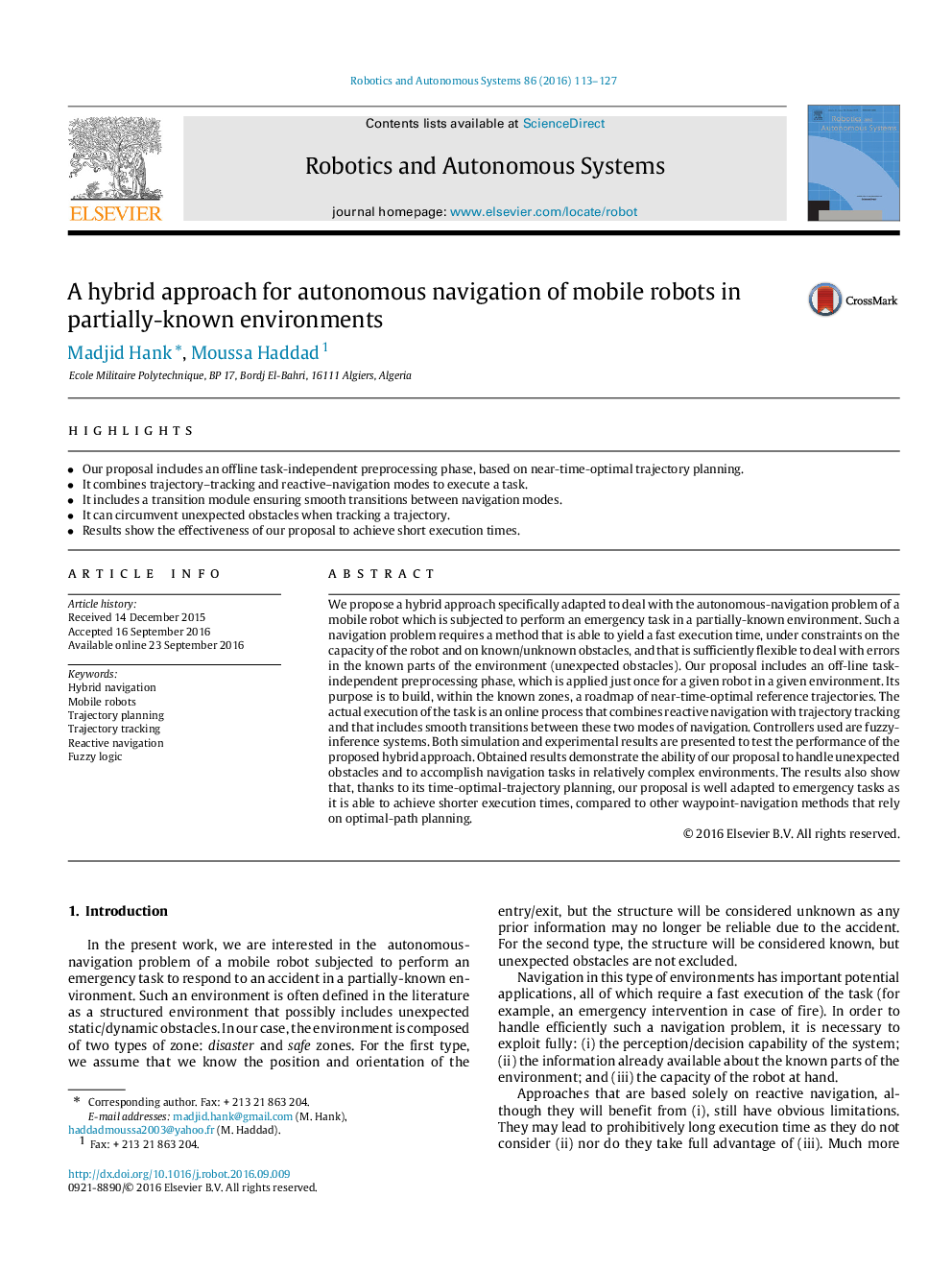| کد مقاله | کد نشریه | سال انتشار | مقاله انگلیسی | نسخه تمام متن |
|---|---|---|---|---|
| 4948914 | 1439856 | 2016 | 15 صفحه PDF | دانلود رایگان |
عنوان انگلیسی مقاله ISI
A hybrid approach for autonomous navigation of mobile robots in partially-known environments
ترجمه فارسی عنوان
یک رویکرد ترکیبی برای ناوبری مستقل روبات های موبایل در محیط های شناخته شده
دانلود مقاله + سفارش ترجمه
دانلود مقاله ISI انگلیسی
رایگان برای ایرانیان
کلمات کلیدی
ناوبری ترکیبی روبات های موبایل برنامه ریزی مسیر پیگیری مسیر ناوبری واکنشی منطق فازی،
ترجمه چکیده
ما پیشنهاد یک روش ترکیبی به طور خاص برای مقابله با مشکل ناوبری خودمختار یک روبات تلفن همراه است که در معرض کار اضطراری در محیط شناخته شده تقریبا شناخته شده است. چنین مشکل ناوبری نیاز به یک روش است که می تواند زمان اجرای سریع را تحت محدودیت ظرفیت ربات و موانع شناخته شده / ناشناخته تولید کند و این به اندازه کافی انعطاف پذیر است تا با اشتباهات در قسمت های شناخته شده محیط (غیر منتظره) موانع) پیشنهاد ما شامل یک فرآیند پیش پردازش مستقل از کار است که فقط یکبار برای یک ربات داده شده در یک محیط خاص اعمال می شود. هدف آن ساختن درون مناطق شناخته شده یک نقشه راه مسیرهای مرجع به موقع بهینه است. اجرای واقعی این کار یک فرایند آنلاین است که ترکیبی از ناوبری واکنشی با ردیابی مسیر و شامل انتقال صاف بین این دو حالت ناوبری است. کنترل کننده ها از سیستم های فوجی استنتاج استفاده می کنند. هر دو روش شبیه سازی و نتایج تجربی برای تست عملکرد روش ترکیبی پیشنهاد شده ارائه شده است. نتایج به دست آمده نشان دهنده توانایی پیشنهاد ما برای رسیدگی به موانع غیر منتظره و انجام وظایف ناوبری در محیط های نسبتا پیچیده است. نتایج همچنین نشان می دهد که به لطف برنامه ریزی زمانبندی مطلوب، پیشنهاد ما با وظایف اورژانسی سازگار است، زیرا قادر به دستیابی به زمان اجرای کوتاه تر، در مقایسه با سایر روش های مسیریابی مسیریابی است که به برنامه ریزی مسیر بهینه کمک می کند.
موضوعات مرتبط
مهندسی و علوم پایه
مهندسی کامپیوتر
هوش مصنوعی
چکیده انگلیسی
We propose a hybrid approach specifically adapted to deal with the autonomous-navigation problem of a mobile robot which is subjected to perform an emergency task in a partially-known environment. Such a navigation problem requires a method that is able to yield a fast execution time, under constraints on the capacity of the robot and on known/unknown obstacles, and that is sufficiently flexible to deal with errors in the known parts of the environment (unexpected obstacles). Our proposal includes an off-line task-independent preprocessing phase, which is applied just once for a given robot in a given environment. Its purpose is to build, within the known zones, a roadmap of near-time-optimal reference trajectories. The actual execution of the task is an online process that combines reactive navigation with trajectory tracking and that includes smooth transitions between these two modes of navigation. Controllers used are fuzzy-inference systems. Both simulation and experimental results are presented to test the performance of the proposed hybrid approach. Obtained results demonstrate the ability of our proposal to handle unexpected obstacles and to accomplish navigation tasks in relatively complex environments. The results also show that, thanks to its time-optimal-trajectory planning, our proposal is well adapted to emergency tasks as it is able to achieve shorter execution times, compared to other waypoint-navigation methods that rely on optimal-path planning.
ناشر
Database: Elsevier - ScienceDirect (ساینس دایرکت)
Journal: Robotics and Autonomous Systems - Volume 86, December 2016, Pages 113-127
Journal: Robotics and Autonomous Systems - Volume 86, December 2016, Pages 113-127
نویسندگان
Madjid Hank, Moussa Haddad,
